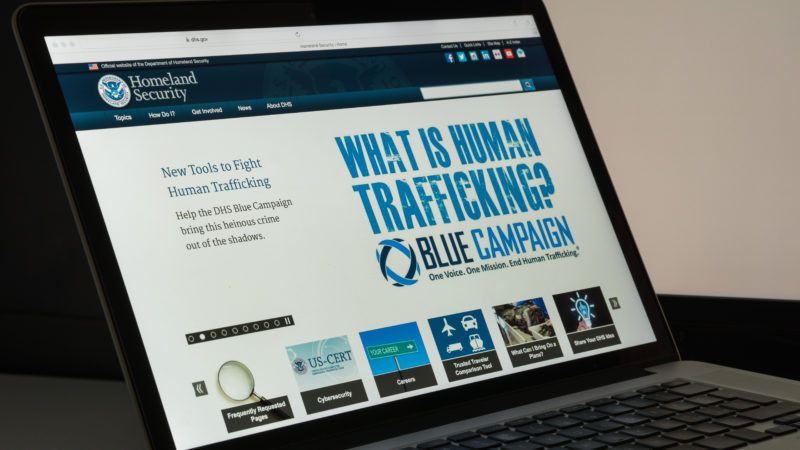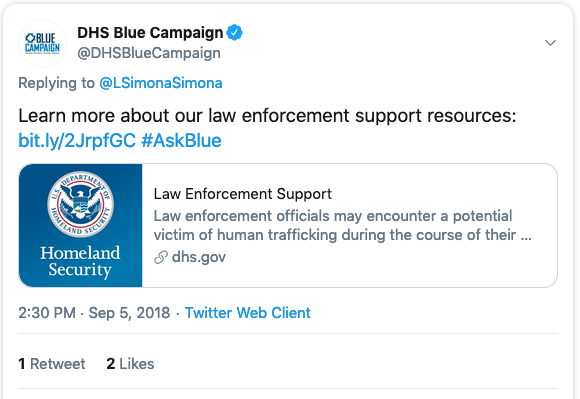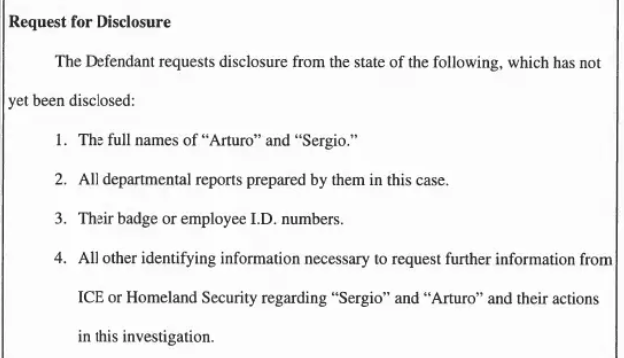ICE Agents Fight Sex Trafficking by Paying Potential Victims for Hand Jobs
In "Operation Asian Touch," federal agents coerced suspected human-trafficking victims into sex acts. Local cops seized money and threw them in jail.

Agents with the Department of Homeland Security (DHS) in Arizona have been "fighting" human trafficking by sending federal immigration agents to coerce suspected victims into paid sex acts. These acts were later used by authorities to justify arresting women who agreed to them, seizing their assets, and telling the press it was these women who were the real predators.
Federal agents had at least 17 sexual encounters with "Asian females" working in massage parlors around Mohave County, Arizona, over a five-month period in 2018, according to new research from the Howard Center for Investigative Journalism at Arizona State University (ASU). Internal ICE documents show these activities had the blessing of agents' supervisors.
When it was all over, the years-long operation yielded three misdemeanor charges stemming from a single sexual encounter which authorities interrupted during a raid.
Absurd and horrifying? Obviously. But also a scenario that is far from an isolated incident.
"Operation Asian Touch"
The Mohave County investigation—dubbed "Operation Asian Touch"—exclusively targeted Asian massage businesses and spas. Police from Bullhead City and Lake Havasu City began the investigation in 2016 after allegedly receiving reports that some employees at these businesses would provide erotic extras along with back and foot rubs.
Local cops decided these businesses were likely human-trafficking fronts after learning that all of the masseuses were Asian women, according to a Homeland Security memo about the investigation. So, Homeland Security Investigations (HSI)—a division of Immigration and Customs Enforcement (ICE)—got involved in spring 2018.
One of the women charged in this operation was Yuqin Shu, an immigrant from China in her mid-50s who ran a licensed foot massage business in Bullhead City. Shu's case first came to my attention last fall, via the Mohave Daily News, which reported that Shu's lawyer was questioning how DHS agents having sex with suspected abuse victims helps protect national security.
"It is unclear how an ICE officer having sexual relations with human trafficking victims in Mohave County, Arizona, protects the nation from terrorist attacks or secures the borders," wrote attorney Brad Rideout in a motion seeking the real names of the undercover agents, who were identified in police documents only as "Arturo" and "Sergio."
I wrote about Shu's case in a larger look at this sordid campaign ("Massage Parlor Panic"), which Reason published in February. Many of the cases described in my article had failed to gain much media attention and, when they did, it was from outlets basically just transcribing police's convoluted and dubious rescue claims. But two of these stories– the 2017 death of Queens-based massage worker Yang Song during a police raid on her workplace, and the 2019 massage-parlor stings in Florida that ensnared New England Patriots owner Robert Kraft—managed to break through the usual fog of sensationalism and bootlicking to attract widespread attention in a way that got people asking good questions.
Homeland Security Investigations was also a part of the Florida stings, with an undercover agent visiting businesses in Indian River Beach and Orange counties and paying women there for sex acts.
Following the recent ASU investigation, national and mainstream media have been discovering and disapproving of "Operation Asian Touch." This is great—so long as nobody mistakes what happened in Mohave County for an atypical investigation.
If you track initial claims about massage parlor-based human trafficking through to their actual conclusions, you'll almost always find law enforcement simply targeting sex workers, small-business owners, immigrants, and the people who patronize them with harassment, assault, arrest, property seizure, prosecution, detainment, and deportation. And the "victims" they allegedly set out to save frequently wind up facing criminal charges.
There are only two roles women can play in this Homeland Security-led charade: helpless sex slave or conniving human trafficker. (Both types of women are invited to stroke ICE agent penises.)
A Victim-Centered Approach?
Shu is one of countless Asian immigrant women terrorized by the U.S. government in a nationwide immigration sweep dressed up as a "victim-centered" effort to save captive girls and women held in "modern slavery." Homeland Security perpetuates the rescue narrative (and asks people to participate in "awareness" and surveillance efforts) through the Blue Campaign.
Many local police departments—including the Bullhead City and Lake Havasu City agencies involved here—ban sexual activity with victims, suspects, or anyone in cop custody. But partnerships with federal agents and confidential informants allow them to circumvent their own policies.
An HSI memo on the Mohave County investigation describes instance after instance of an undercover federal agent (U.C.) telling a masseuse "to masturbate him." It includes accounts like "the female placed oil on her hand and began to stroke the U.C.'s penis. After a few minutes, the female stopped and gave the U.C. a towel to clean himself." Or "she masturbated the U.C. untill [sic] he told her he was done." In several instances, ICE agents paid extra for masseuses to strip naked or go topless while jerking them off.

Some HSI incident reports are peppered with descriptions like "the female was very skinny with small breasts," or "the Asian female had black hair and was wearing a black shirt, black skirt, fishnet stockings, and heels."
Not all of the massage workers that ICE agents visited would agree to sex acts. The HSI memos muse that this is probably because the women were on to their agents' identities (and not that some of these workers just choose to not do that).
After a few months of ICE agents trying to finagle sex from women they described as likely victims of human trafficking, federal and local law enforcement made a big to-do about their "rescue" work. In a September 2018 article with a headline touting the "8 arrested in human trafficking investigation," the Arizona Republic noted that ICE officials "held a joint press conference … with the Lake Havasu City and Bullhead City police departments, about the extensive undercover operation that led to the arrests."
Police told the press that Shu was suspected of a range of horrible offenses. This included trafficking persons for forced labor, unlawfully obtaining labor, procuring people for a house of prostitution, and sex trafficking, the Arizona Republic reported on September 26. But the next day, when Shu was charged, none of the more severe offenses were part of the indictment.
Ultimately, Shu was charged with money laundering in the first degree and operating a house of prostitution—both felonies—for allegedly agreeing to sexual activity with ICE agents. The affidavit to get a warrant for Shu's arrest stated that "an undercover agent with the Homeland Security Investigation team" went to Shu's house on three separate occasions—May 15, June 21, and September 17, 2018—and paid Shu to perform sex acts for him, according to Shu's motion to compel information on the agents.

Secrecy About Sex With Victims Trumps Catching Criminals
Last fall, the Mohave County Superior Court said Homeland Security should indeed have to turn over information about "Arturo" and "Sergio"—and that the pair could not be used as witnesses unless the court got their full names and addresses.
DHS responded by telling Mohave County police and prosecutors it would not be participating in the case any further.
As a result, in December 2019, prosecutors dismissed all charges against Amanda Yamauchi and Dean Michael Bassett—the pair whom authorities had initially described as the heads of a "transnational criminal organization." Either that description was just spin all along, or DHS is willing to let evildoers go free rather than answer questions about its policy of agents getting off on sex trafficking.
A few weeks later, on December 30, the charges against Yuqin Shu and another woman, who had been charged with prostitution, were dropped.
Ultimately, the operation that consumed years of police, court, and federal agency time landed just three state misdemeanor convictions, all stemming from a single incident of sexual activity for pay. A 45-year-old woman was convicted of prostitution—landing her 56 days in jail and a $600 fine—while the man who paid her was convicted of solicitation. Her husband, who drove her to the massage parlor where this took place, accepted a plea deal on one charge of attempted pandering.
The whole thing is "a lesson in how not to fight human trafficking," opines the editorial board of Today's News-Herald, a newspaper covering Lake Havasu City. "Homeland Security clearly hopes the whole thing will just go away," they write. "Requests for information from the News-Herald have gone unanswered by the agency."
ICE spokeswoman Yasmeen Pitts O'Keefe told ASU reporters that in Operation Asian Touch, "conduct by a limited number of HSI agents involved in the investigation was not consistent with HSI policy."
But that's untrue, say Arizona police. "Our understanding of (Homeland Security) policy is that their investigators are allowed to participate in sex acts while working undercover," Dan Doyle, police chief for Lake Havascu City, told Today's News-Herald last December.
"Detectives were informed by HSI that the undercover sexual activity was authorized," Bullhead Police Department spokeswoman Emily Fromelt told Howard Center reporters.
Nothing in Homeland Security rules explicitly ban agents from engaging in sexual activity as part of investigations. Meanwhile, an HSI manual expressly states that "otherwise illegal" activity is sometimes OK for undercover agents. Possible justifications for such activity are broad, including the need to "establish or maintain credibility of a cover identity" or to "obtain information or evidence … not reasonably available without participation in the otherwise illegal activity."
Cops Get Their Cut
While these stories are getting more national attention, most big outlets are missing the fact that this whole operation was something of a farce to begin with—an immigration enforcement effort and old-fashioned vice sting under the guise of something more heroic. Some reports suggest that federal authorities started off with only the most sincere concern for masseuses' welfare and that things then went awry.
If that's the case, they sure have a screwy way of expressing concern. All I see in this case is authorities exploiting people they called sex slaves, and then refusing to show up for them when it comes time to seek justice. ICE agents paid potential victims to make them orgasm, then disappeared, while local police misled the press about it, then stole from "victims" through the racket known as civil asset forfeiture.
HSI Deputy Special Agent in Charge Lon Weigand said at a press conference that $128,000 in cash and around $30,000 worth of gold coins and jewelry were seized during the operation. According to ASU's report, most of this—$105,120—has not been and will not be returned, despite most of the cases being dismissed.
At the 2018 press conference, Lake Havasu City Police Chief Dan Doyle crowed that this investigation is "a great example of 'see something, say something'," referring to the centerpiece slogan of many Homeland Security efforts, including those related to human trafficking.
He's right, of course—the Mohave County debacle is a perfect example of how HSI and ICE fight human trafficking and sexual exploitation. That is exactly why Homeland Security's sex-trafficking savior sham needs to stop.


Show Comments (75)